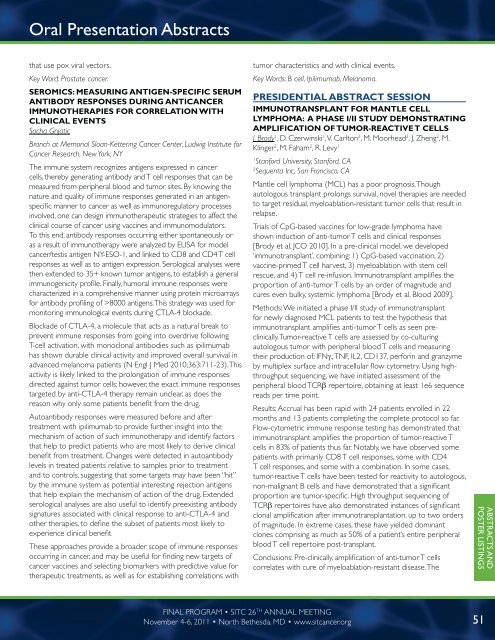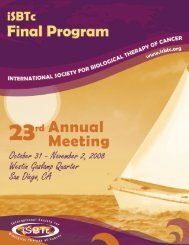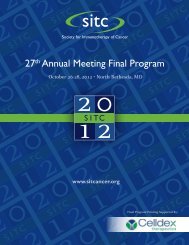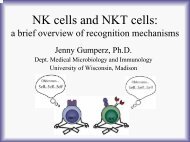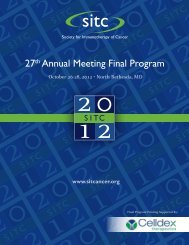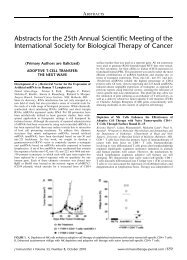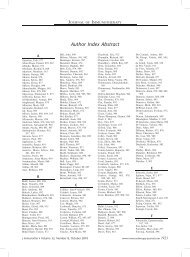FINAL PROGRAM - Society for Immunotherapy of Cancer
FINAL PROGRAM - Society for Immunotherapy of Cancer
FINAL PROGRAM - Society for Immunotherapy of Cancer
Create successful ePaper yourself
Turn your PDF publications into a flip-book with our unique Google optimized e-Paper software.
Oral Presentation Abstracts<br />
that use pox viral vectors.<br />
Key Word: Prostate cancer.<br />
SEROMICS: MEASURING ANTIGEN-SPECIFIC SERUM<br />
ANTIBODY RESPONSES DURING ANTICANCER<br />
IMMUNOTHERAPIES FOR CORRELATION WITH<br />
CLINICAL EVENTS<br />
Sacha Gnjatic<br />
Branch at Memorial Sloan-Kettering <strong>Cancer</strong> Center, Ludwig Institute <strong>for</strong><br />
<strong>Cancer</strong> Research, New York, NY<br />
The immune system recognizes antigens expressed in cancer<br />
cells, thereby generating antibody and T cell responses that can be<br />
measured from peripheral blood and tumor sites. By knowing the<br />
nature and quality <strong>of</strong> immune responses generated in an antigenspecific<br />
manner to cancer as well as immunoregulatory processes<br />
involved, one can design immunotherapeutic strategies to affect the<br />
clinical course <strong>of</strong> cancer using vaccines and immunomodulators.<br />
To this end, antibody responses occurring either spontaneously or<br />
as a result <strong>of</strong> immunotherapy were analyzed by ELISA <strong>for</strong> model<br />
cancer/testis antigen NY-ESO-1, and linked to CD8 and CD4 T cell<br />
responses as well as to antigen expression. Serological analyses were<br />
then extended to 35+ known tumor antigens, to establish a general<br />
immunogenicity pr<strong>of</strong>ile. Finally, humoral immune responses were<br />
characterized in a comprehensive manner using protein microarrays<br />
<strong>for</strong> antibody pr<strong>of</strong>iling <strong>of</strong> >8000 antigens. This strategy was used <strong>for</strong><br />
monitoring immunological events during CTLA-4 blockade.<br />
Blockade <strong>of</strong> CTLA-4, a molecule that acts as a natural break to<br />
prevent immune responses from going into overdrive following<br />
T-cell activation, with monoclonal antibodies such as ipilimumab<br />
has shown durable clinical activity and improved overall survival in<br />
advanced melanoma patients (N Engl J Med 2010;363:711-23). This<br />
activity is likely linked to the prolongation <strong>of</strong> immune responses<br />
directed against tumor cells; however, the exact immune responses<br />
targeted by anti-CTLA-4 therapy remain unclear, as does the<br />
reason why only some patients benefit from the drug.<br />
Autoantibody responses were measured be<strong>for</strong>e and after<br />
treatment with ipilimumab to provide further insight into the<br />
mechanism <strong>of</strong> action <strong>of</strong> such immunotherapy and identify factors<br />
that help to predict patients who are most likely to derive clinical<br />
benefit from treatment. Changes were detected in autoantibody<br />
levels in treated patients relative to samples prior to treatment<br />
and to controls, suggesting that some targets may have been “hit”<br />
by the immune system as potential interesting rejection antigens<br />
that help explain the mechanism <strong>of</strong> action <strong>of</strong> the drug. Extended<br />
serological analyses are also useful to identify preexisting antibody<br />
signatures associated with clinical response to anti-CTLA-4 and<br />
other therapies, to define the subset <strong>of</strong> patients most likely to<br />
experience clinical benefit<br />
These approaches provide a broader scope <strong>of</strong> immune responses<br />
occurring in cancer, and may be useful <strong>for</strong> finding new targets <strong>of</strong><br />
cancer vaccines and selecting biomarkers with predictive value <strong>for</strong><br />
therapeutic treatments, as well as <strong>for</strong> establishing correlations with<br />
tumor characteristics and with clinical events.<br />
Key Words: B cell, Ipilimumab, Melanoma.<br />
PRESIDENTIAL ABSTRACT SESSION<br />
IMMUNOTRANSPLANT FOR MANTLE CELL<br />
LYMPHOMA: A PHASE I/II STUDY DEMONSTRATING<br />
AMPLIFICATION OF TUMOR-REACTIVE T CELLS<br />
J. Brody 1 , D. Czerwinski 1 , V. Carlton 2 , M. Moorhead 2 , J. Zheng 2 , M.<br />
Klinger 2 , M. Faham 2 , R. Levy 1<br />
1<br />
Stan<strong>for</strong>d University, Stan<strong>for</strong>d, CA<br />
2<br />
Sequenta Inc, San Francisco, CA<br />
Mantle cell lymphoma (MCL) has a poor prognosis. Though<br />
autologous transplant prolongs survival, novel therapies are needed<br />
to target residual, myeloablation-resistant tumor cells that result in<br />
relapse.<br />
Trials <strong>of</strong> CpG-based vaccines <strong>for</strong> low-grade lymphoma have<br />
shown induction <strong>of</strong> anti-tumor T cells and clinical responses<br />
[Brody et al, JCO 2010]. In a pre-clinical model, we developed<br />
‘immunotransplant’, combining: 1) CpG-based vaccination, 2)<br />
vaccine-primed T cell harvest, 3) myeloablation with stem cell<br />
rescue, and 4) T cell re-infusion. Immunotransplant amplifies the<br />
proportion <strong>of</strong> anti-tumor T cells by an order <strong>of</strong> magnitude and<br />
cures even bulky, systemic lymphoma [Brody et al, Blood 2009].<br />
Methods: We initiated a phase I/II study <strong>of</strong> immunotransplant<br />
<strong>for</strong> newly diagnosed MCL patients to test the hypothesis that<br />
immunotransplant amplifies anti-tumor T cells as seen preclinically.<br />
Tumor-reactive T cells are assessed by co-culturing<br />
autologous tumor with peripheral blood T cells and measuring<br />
their production <strong>of</strong>: IFN TNF, IL2, CD137, per<strong>for</strong>in and granzyme<br />
by multiplex surface and intracellular flow cytometry. Using highthroughput<br />
sequencing, we have initiated assessment <strong>of</strong> the<br />
peripheral blood TCR repertoire, obtaining at least 1e6 sequence<br />
reads per time point.<br />
Results: Accrual has been rapid with 24 patients enrolled in 22<br />
months and 13 patients completing the complete protocol so far.<br />
Flow-cytometric immune response testing has demonstrated that<br />
immunotransplant amplifies the proportion <strong>of</strong> tumor-reactive T<br />
cells in 83% <strong>of</strong> patients thus far. Notably, we have observed some<br />
patients with primarily CD8 T cell responses, some with CD4<br />
T cell responses, and some with a combination. In some cases,<br />
tumor-reactive T cells have been tested <strong>for</strong> reactivity to autologous,<br />
non-malignant B cells and have demonstrated that a significant<br />
proportion are tumor-specific. High throughput sequencing <strong>of</strong><br />
TCR repertoires have also demonstrated instances <strong>of</strong> significant<br />
clonal amplification after immunotransplantation, up to two orders<br />
<strong>of</strong> magnitude. In extreme cases, these have yielded dominant<br />
clones comprising as much as 50% <strong>of</strong> a patient’s entire peripheral<br />
blood T cell repertoire post-transplant.<br />
Conclusions: Pre-clinically, amplification <strong>of</strong> anti-tumor T cells<br />
correlates with cure <strong>of</strong> myeloablation-resistant disease. The<br />
ABSTRACTS AND<br />
POSTER LISTINGS<br />
<strong>FINAL</strong> <strong>PROGRAM</strong> • SITC 26 TH ANNUAL MEETING<br />
November 4-6, 2011 • North Bethesda, MD • www.sitcancer.org<br />
51


